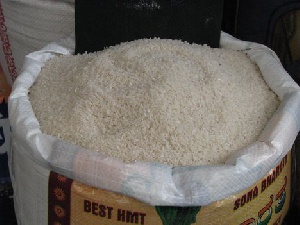...amid pressure to mop-up more farm produce
While farmers want an increase in the volumes of produce and the prices guaranteed them by the National Food Buffer Stock Company (NAFCO), the company says it is constrained by enormous funding challenges, making it operate way below its capacity.
Established in 2010 to mop up excess produce on the market at a guaranteed minimum price, NAFCO has been revolving an initial investment by government of GH?15million.
The amount is only 11.5% of the GH?130million that the committee that worked on its establishment proposed. The company, which operates on a marginal profit basis, is thus unable to invest in storage facilities and mop up as much produce as it could.
“Warehousing has been our major challenge,” NAFCO’s Director of Operations, Ken Acquaye, told the B&FT on the sidelines of the presentation of findings from research conducted by the Peasant Farmers Association of Ghana on the company’s operations.
“The warehouses we inherited from the defunct Food Distribution Company came to 34,000 metric tonnes total capacity. This is woefully inadequate and close to half of that is in a deplorable state and cannot be used. A lot of renovation has to be done. In fact, some of the warehouses might even have to be pulled down, and then it would be cheaper to build new ones,” he said.
Discussions, he said, are ongoing with the Export Development and Agricultural Investment Fund (EDAIF) for a GH?20million facility to expand their operations.
“The amount can actually build just a few warehouses, but about half of it will go into purchases,” he said.
There are about 75 Licenced Buying Companies (LBCs) which buy from farmers at the farm-gate on behalf of NAFCO.
Although NAFCO says it is a buyer of last resort, farmers prefer to sell to the company due to their own challenges with market access and good prices. Even so, the farmers feel the company could do better for them in terms of prices.
Ken Acquaye told the farmers, however, that NAFCO does not unilaterally determine the prices it pays for maize, rice and soya beans -- the three main commodities it deals in.
The research by the Peasant Farmers Association indicated that about 80% of the relatively few farmers NAFCO buys from are not happy with the prices it offers for their produce.
The researcher, Baba Tuahiru, said 68% of farmers across the country are not aware of the existence of NAFCO and that 84% of farmers have never sold to the company.
“When farmers are aware of NAFCO’s buying agents they will demand to be paid prices as announced by NAFCO for any given year,” he said.
Among NAFCO’s functions is to expand the demand for food grown in Ghana by selling to state institutions such as the military, schools, hospitals, prisons, and to manage Government’s emergency food security.
The company complains, however, that a lot of government institutions are frustrating its efforts by claiming they have to stick to rules established under the procurement law.
So far, only the School Feeding Programme and the National Disaster Management Organisation (NADMO) have been buying from NAFCO.
For the 2013/2014 crop season, the company hopes to mop up 15,000 metric tonnes of maize (300,000bags), 15,000 metric tonnes of rice and 1,000 metric tonnes of soya beans.
Business News of Monday, 3 February 2014
Source: B&FT













